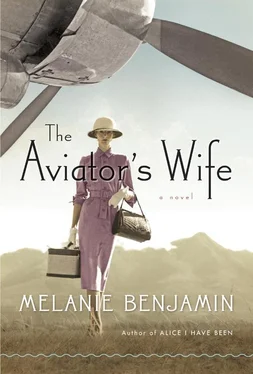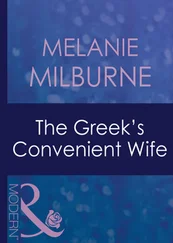“Anne, you’re being ridiculous. I fly—I work. That’s what I do.”
“That’s what I used to do, too,” I reminded him. But what did I do now? I waited, fretted, longed, simmered. Meanwhile, I received letters from women envying me my perfect marriage—the one I had conjured up in the pages of my book. My prayer, which was, as yet, unanswered. Perhaps because I had wasted too many years praying to the wrong deity.
“It’s different now.” Charles was warming up to one of his favorite themes: the Dangers of the Modern World. “The world is changing—too fast, I think. Someday, I’ll want to step back and simplify. I need to know that this place will be here, then. I need—” His voice faltered, and he took a sip of milk to disguise it. “I need to know where you are,” he continued, pushing at his cake with his fork. “I just need to know where you are, and I like to know that you are here, safe, where I put you. I would think that you, of all people, would understand that.”
I opened my mouth, but my heart was suddenly in my throat, preventing speech. I slumped back in my seat, stunned.
I’d never told him about having to explain to our children, one by one, about their murdered brother, after they first found out about him in school. I’d never told him about the box of pictures I still kept beneath my bed.
But my husband had not moved on as thoroughly as he had tried to convince us both he had. And I hurt for him, just as I had hurt for my children at his hands; for the first time, I saw myself in the stronger role. Anger and resentment aside, I had healed; I shared my grief with others who wrote me to share theirs—countless women over the years, seeking my counsel. And I had loved our surviving children, fully participated in their lives, risking my heart over and over again for them.
But Charles—
The distance he put between himself and us; the pushing, the cajoling—was it his way of protecting himself? For so long I had wanted to believe that our baby’s death had not sundered us; I had thought it had drawn us together, made us rely upon each other, only. But now, I saw with eyes as clear as my husband’s, that it hadn’t.
I couldn’t help him now, not even if he’d asked me to, which he never would. Once, maybe; once upon a long time ago. But not now.
Sipping my coffee, I chose my next words very carefully.
“We don’t have to sell,” I said. “I have money, of course, from Mother and Daddy. We can keep this place until Reeve has graduated, at least, and then—for the future, for holidays. I might like to rent an apartment in the city, though. I would like to be closer to people, to the theater, shopping—things like that.”
“What on earth would you want to be closer to all that for?” He was genuinely surprised. He laid his fork down, peering at me as if he’d never seen me before—and I was reminded of how he used to look at me, back when we were courting. Clinically, scientifically; as if he needed to try to figure out the inner workings of my brain.
I smiled at the memory, and his face flushed red as he looked away again, caught. “Charles, I am fifty years old. I was a city girl when you met me, remember? I have never lived in a home of my own choosing. You’ve always chosen. Your life, your fame, have always dictated where I live. I do think it’s time that I get to live for myself, don’t you? Choose my own friends, at least?”
“You’ve read your own book, haven’t you?” He frowned, but I caught the admiring little gleam in his eyes, and now it was my turn to blush.
To his credit, Charles had been nothing but proud—if slightly puzzled—by the success of Gift from the Sea . He’d even consented to pose for a pictorial for Time magazine when it came out. I’d only had to remind him once how I’d done the same thing for his book.
“Perhaps,” I admitted. “I am serious, though.”
“I know you are. I’ve never known you not to be that. Well, I suppose that sounds like a reasonable plan. Are you sure this is what you want?”
“Yes, this is what I want.”
He stared at me, hard; I stared back. Once, a lifetime ago, our gazes had met and it was immediately electric, powerful—so powerful that it frightened us both. There were times, even now, when our eyes would meet and I would feel a thrill jolt through me, shocking my entire being into overdrive.
But this gaze was not like that; it was an assessment. An acknowledgment that I was taking a step that neither of us had ever thought I would, but that he had been pushing me toward, unconsciously, for years now. He’d trained me, he’d taught me—too well, I could almost hear him thinking.
Finally, I was strong. I was able. Able to separate my life from his; able to separate myself, from him. Like all surgical procedures, it would not be without pain and regret.
We continued to eat without talking. Silence, after all, had been the thing that brought us together, all those years ago; he’d said he’d never met a girl so comfortable not talking, as I was.
But now that I had found my voice, I wanted to use it; I had the feeling that once I started talking, I might never shut up. And to that end, I wanted to find someone who wanted to listen to me as much as I wanted to talk to him.
And I knew, sadly, finally, that that someone was never going to be my husband.
CHAPTER 19

1958
I’D LEFT IT IN A STACK of mail on the table in the entryway. Later, I had to wonder if I’d done it on purpose, but then, that’s where I always left the mail. I’d glanced at the envelope, saw my name in the familiar handwriting, Anne Lindbergh , and smiled, then left it there—a treat for later, I supposed I thought. After Ansy and I returned from the city.
My daughter was about to leave for Radcliffe and she needed a new wardrobe. Of my two daughters, she was the one who was the most feminine; she was tiny and blond, with eyes that looked mischievous because of the way they turned up at the ends. But she was not mischievous; she was the most solemn of my children, even more solemn than Jon.
She was also the one who hated being a Lindbergh the most; the one who sobbed when a reporter wrote a story about her classroom picnic when she was ten, simply because she was Charles Lindbergh’s daughter. The one who, when she was a teenager, cut off her long blond braids because a newspaper article mentioned them. And because her name happened to be Anne Lindbergh, she got double the dose of unwanted, reflected glory; every Mother’s Day, some magazine wanted to interview the two of us, the “two Annes.”
I wondered if that was why, when she got over her adolescent embarrassment, she made herself so determinedly fashionable, so delightedly girlish. Those were two traits I had never possessed, and these were ways she could establish her own identity, separate from mine.
That afternoon we’d burst into the house, bags hanging from our arms, and went our separate ways until dinner; she, to try on everything all over again; me, to collapse for half an hour. Shopping was exhausting; I was too much my own mother’s daughter. I preferred to order five of the same kind of dress or sweater or skirt in different colors, and be done with it. But Ansy had tried on every outfit she saw, even if she had no intention of buying it, just for fun.
I removed my hat, my gloves—my daughter had pronounced them so “terribly dowdy, Mother.” It was true that I hadn’t bought a new hat in years, although some of the ones I’d seen today—smaller, with darling wisps of veils, little in the way of flowers or feathers—had looked very tempting. Maybe I’d buy one next time I was in the city; next week he and I were going to the theater, then dinner after—
Читать дальше













